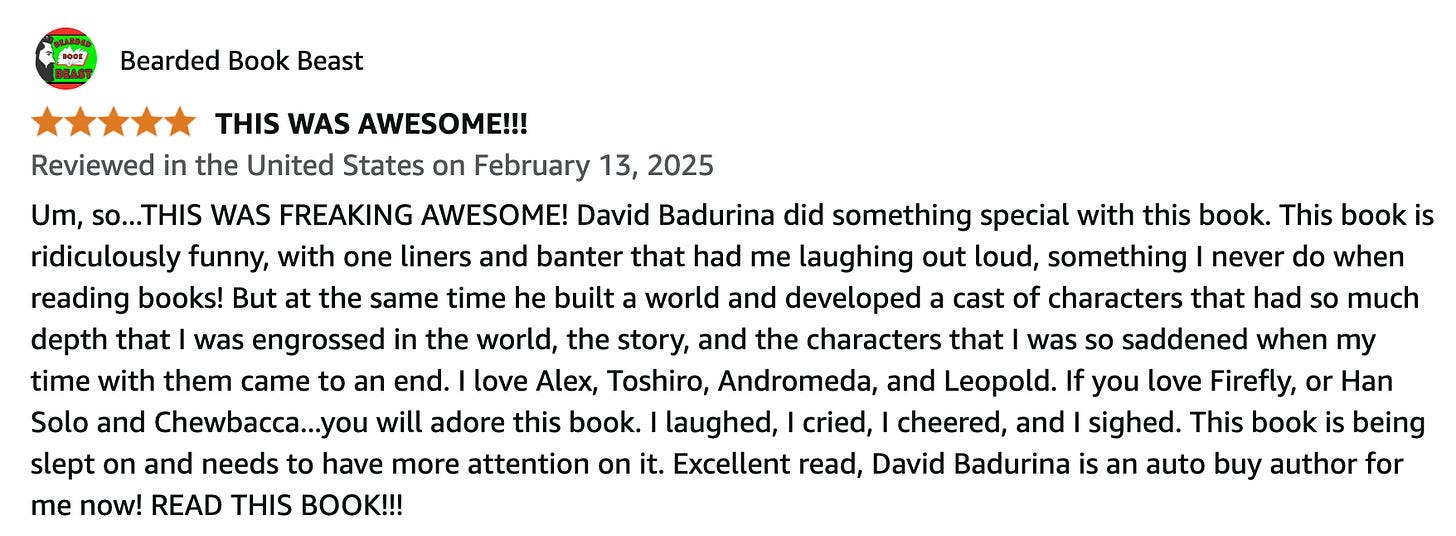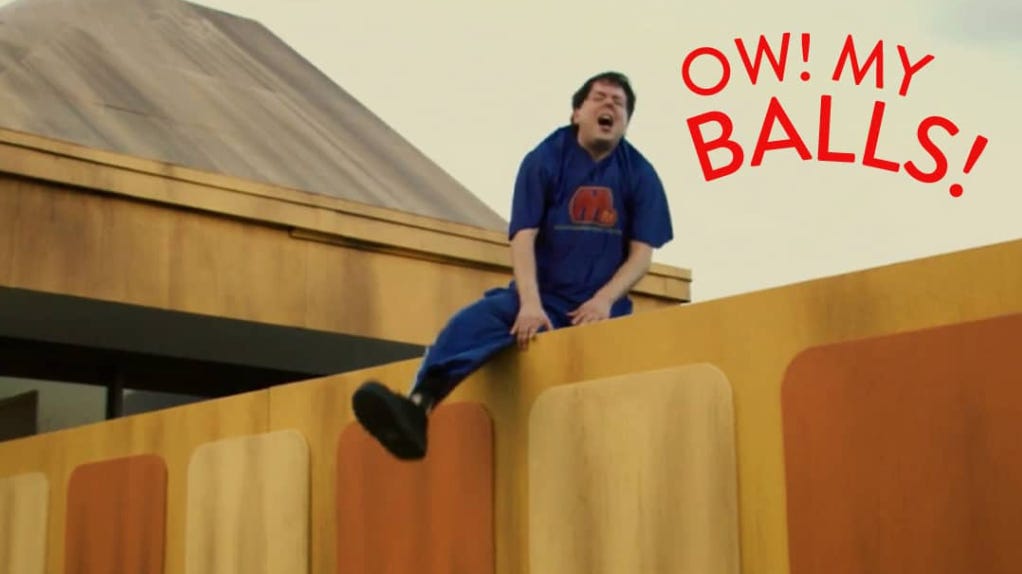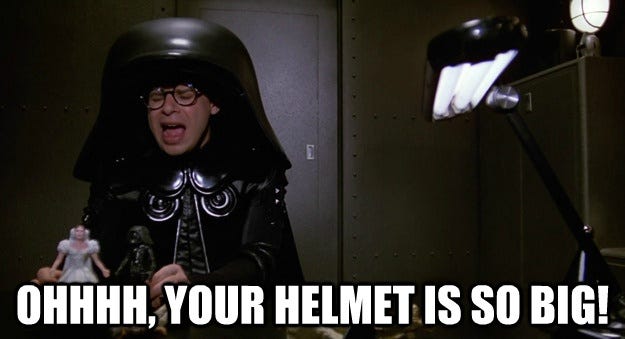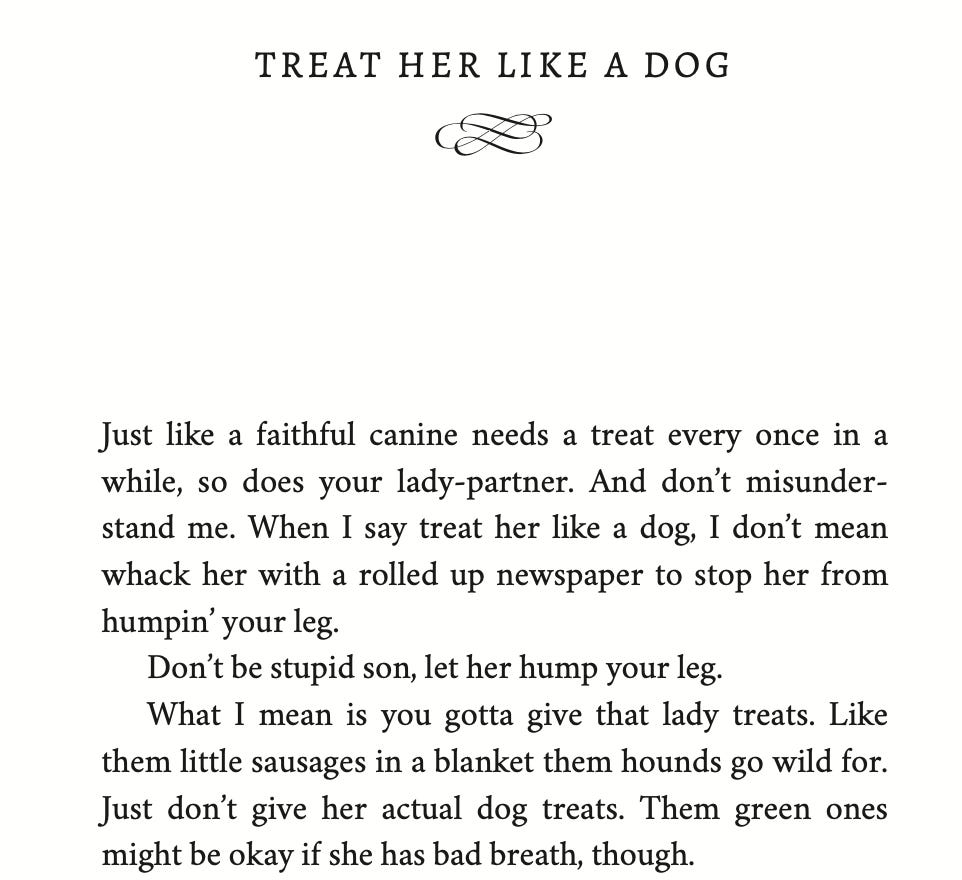Comedy is HARD.
Just like your mom.
Subtitle aside (for now), comedy has been on my mind quite a bit of late. I don’t consider myself a straight-up humor author or any type of comedian. I don’t have stage chops, but I can certainly get a room laughing (I’ve had to do this to frequently break tension in a prior career operating a martial arts dojo), or get a reader laughing alone at home with a copy of SPACE PEW PEW in their hands.
What I want to explore here is why comedy in the written word can be supremely challenging - deceptively so - and how I tend to go about it to get reviews like this:
So with that in the bank, let’s explore some of the challenges when dousing your manuscript with some liquid comedy, and lighting the match. Hold my beer and all that.
Funny How?
Writing is hard, folks. You’re juggling multiple balls (er …. nah, too easy). There’s dialogue, scene, world building, character development, narrative arc and so much more that goes into crafting a story that resonates with readers.
If writing is akin to a juggling act where you’re grabbing all these balls and tossing them right past your face (nvm, couldn’t resist), COMEDY is that moment where someone off-stage throws in a flaming chainsaw. It amps up the difficulty, and one of two things can happen. You can either impress the shit out of people by nailing the act in a wildly entertaining display, or you’re going to drop shit, and everyone is going to be disappointed.
Sure, you’ll have the occasional onlooker who’s going to fold their arms and claim that what you’re doing is no big deal, but we don’t care about those weirdos - they are outliers and likely miserable on account of never being properly loved.
Comedy lands, unless it doesn’t. There is no grey area. And as a writer, you try and try to maintain that juggling act. Sometimes you’ll cut yourself, sometimes it’ll work brilliantly, and (hopefully infrequently) you’ll drop some shit. That’s part of the game.
The most important thing to have a handle on is this question: What is funny?
Core Comedic Elements
I’m going to go very general here because you can study comedy for years and still find new subtopics to explore. Let’s hit some of the major ones, and dive into a little bit about what makes them work, and if they can work in writing.
Slapstick Comedy:
The least suited performative comedy at the disposal of your typical writer. Slapstick works in Three Stooges because it is instant, visual, and universally understood. The modern equivalent are fail videos on TikTok, or the brilliantly satirical “Ow, My Balls,” mock television show from the equally brilliant cultural commentary flick, Idiocracy.
Pulling this off in written work is really difficult (for this writer, at least). The scenes are so stripped down with a focus on the physical, that inevitably the time it takes to read the words and generate the visual in a reader’s mind renders it unfunny before the gag actually hits. It’s the writing equivalent of the Chicken and the Egg thought experiment, but instead of a chicken, it’s violence, and instead of eggs, it’s your balls.
See what I mean? The Three Stooges was brilliant for what it was - perhaps the gold standard of slapstick comedy (as opposed to physical comedy, like Lucille Ball stuffing her face full of chocolate whizzing by on a conveyor belt). Slapstick is the easiest form of comedy to understand - you don’t need to speak the same language or be from the same country or be the same age to laugh at someone being hit in the twig-n-berries, and as such, it’s ironically the least funny in written word which naturally cripples the precise things that make slapstick funny.
“Play” Comedy:
Here’s some of the good stuff. “Play” is just that - playing on words, playing with puns, playing with a scene. It’s the embodiment of absurdity for the sake of absurdity. Monty Python. Airplane! Spaceballs.
Play comedy is that freewheeling exploration of something funny because it’s simply funny.
A nod to Rick Moranis here, who ad-libbed this entire scene in Spaceballs. And in a glorious moment of exponential comedy, Colonel Sandurz has what I consider to be the best placed single word in this entire movie …
“Again …”
Read it without the word “again” and it isn’t funny. That is a prime example of the delicate complexity of comedy. Yes, the situation is absurd and funny. Yes, the “helmet is so big” quip is funny. But that single word, “again” elevates this entire scenario to something really special.
That’s great comedic writing, and it’s all just play. In SPACE PEW PEW, I frequently make use of “play absurdity” in scenes because it lends itself so well to situational humor (ie: relatable humor, a sub-genre of play as far as I am concerned). Take this exchange between Alex and his android best-buddy Toshiro - after Alex loads Toshiro with current-day culture and slang:
Absurd situation, low stakes, and “play.”
And now, it’s time to relieve yourself.
“Tension” Comedy:
Tension comedy is the somber wailing of a violin, graveside among a crowd of sobbing onlookers. It’s the serious emotional weight (we’ll get back to this in a moment) of a time and place, broken by the sound of Grandma’s violent SHART the moment the last note fades.
(Insufferable Academic Note: The shart (see above) is also considered a “benign violation” - abrupt comedic disruption of a societal or situational norm)
In the same ballpark as the unexpected release provided by an ill-timed shart, we have that scene from Goodfellas where it goes from hysterical laughter to serious, unfunny tension, and then a brilliant and hysterical payoff.
My theory here is that the physical reaction of a tension release induces the laughter because what we thought had emotional weight or danger is immediately dispersed to something non-threatening.
And just like a great recipe, this one needs a few ingredients: Stakes, emotion, investment. For tension to work in writing, there needs to be a build up of some kind. If there’s danger? Great. If there’s emotion involved? Perfect. Investment in character and relationships? All the better.
In the Goodfellas scene, we already know Joe Pesci’s character has a spicy temper, and that he easily flies off the handle. This is why the tension build up in the scene is so legendary.
Where “Play” comedy is more of a helicopter - lifting straight up and off into the sky at any moment, “Tension” comedy is an airplane. There needs to be a runway of some sort, and the longer it is (don’t do it … don’t do it) the better. That liftoff that happens when you’ve established emotional weight to character or scene and the gag finally hits is … *chef’s kiss*.
The less time you spend developing the stakes, the less weight the tension-breaking gag has when it finally hits. The more time you spend (Pesci’s character development, for instance), the heavier the hit and the bigger the payoff.
Which brings us to my final exploration of core comedy principles …
“Incongruity”
And here it is, folks. The golden goose of comedy in the written word - perfectly suited to all things language - incongruity. This is comedic magic in my humble opinion, because it’s the subversive manipulation of a reader’s brain. It’s using a scenario, a bit of dialogue, or some type of situation that is predictable and immediately turning it upside-down.
But magic? Why call it that?
Because this is deeply psychological humor. It’s the humor you don’t see coming because the author skillfully leverages your brain’s natural function and desire for pattern recognition to lull it into autopilot right before they smack you upside the head with the wonderful and unexpected punchline.
I present this passage from my soon-to-be-released book (May 14th 2025!) “HOW TO EXPOSE YOURSELF TO WOMEN (Emotionally or Whatever)”:
It doesn’t need to be noted that this is my favorite type of comedy to write - little unexpected twists to wrap up an absurd point or moment. In this case, my attempt is to yank you, the reader, into different directions just as you start to form predictive patterns.
The title alone does this. I tell someone I’m writing a book about relationships. They say, “That’s nice! What’s it called?” and I return with, “How to expose yourself to women.”
Incongruity.
In the above passage, Uncle Floyd does this twice (three times, arguably, considering the title of this section). The “let her hump your leg” is an unexpected turn, as is “might be okay if she has bad breath, though,” when referencing feeding your lady-friend dog treats.
Another example for you SPACE PEW PEW fans is during the negotiation between Alex and his new friend - mad mushroom-headed scientist, Leopold.
Alex is looking for quick cash, and decides to ingest a particular pill in exchange for a pile of money. All of the stakes are laid out and understood until the answer by Leopold to a mundane question posed by Alex:
The natural pattern recognition of wondering when you’ll feel the effects of medicine is something just about anyone can relate to. It’s present for alcohol, for anti-inflammatories, or for pain-killers. The incongruity here is that last line - after a quick negotiation and Alex’s smug confidence, when it is too late, that final detail is the unexpected comedic twist.
(Insufferable Academic Note: Alex’s unearned confidence energy in the above scene adds a layer of what you’d call “superiority theory” in comedy - this set-up is intentionally written to place you, the reader, into a position of superiority over Alex’s smug ego, to amplify the laugh delivered by the last line.)
Hell, incongruity is even in the title for this particular Substack article:
Yes, an exploration of comedy in terms of writing, and also a reference to your mom’s penis. The subversion of expectation and pattern recognition, turned on it’s head by a follow-up.
In Closing …
I fully realize that the least funny thing you can do is explain jokes. But it’s important to have a handle on what makes something funny within your writing, how to leverage core comedic principles to throw in some well-timed gags (be it dark humor, or full-on absurdity), and to have some tools in your toolbox to color your own writing with words that can greatly enhance your reader’s journey.
Give them emotional depth. Give them great character relationships. When they least expect it, give them a laugh, and that adds a great deal of depth to your storytelling.
Keep all of this in mind, and I promise you, the unfettered joy of sprinkling in well-timed humor will provide your readers with an experience they’ll not soon forget.
Like a graveside shart.













Delightful!
All very well said. I used quite a bit of various types of humor in Galaxy's Most Wanted. A lot of it dealt with the Fish out of Water trope with Kai being a typical Earthman suddenly thrust (don't do it) into the greater galaxy at large.
Some if it was found in the absurdity of certain cultural aspects vs Earth's, like the fact that the race that created the AI that programed the battlebots doesn't use fictional narrative. This led to them being accidentally programmed with all of Earth's war movies because the AI thought they were documentaries.
Some if it was absurdity, like the Grey alien Nruz, who is so obsessed with 1980's American culture, he worships Van Halen and talks like Bill and Ted.
All of this was injected (STOP THAT. GET SOME HELP) into a story involving the fun on interstellr crime and the horrors of interstellar war. So basic tension breakers.
Party on David!